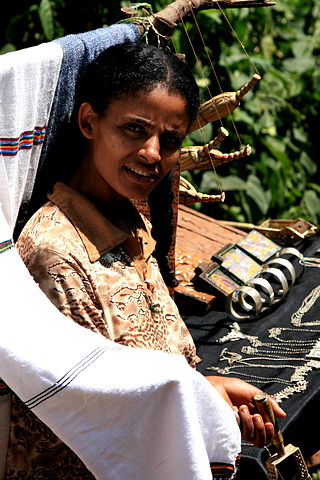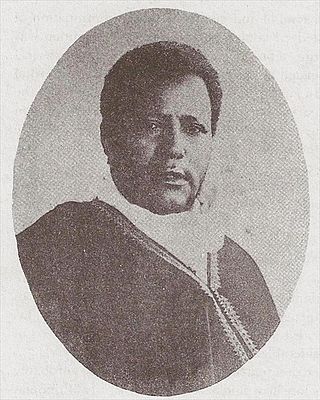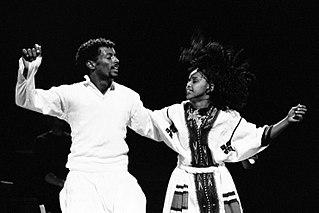Related Research Articles
Ethiopian music is a term that can mean any music of Ethiopian origin, however, often it is applied to a genre, a distinct modal system that is pentatonic, with characteristically long intervals between some notes.

Amharas are a Semitic-speaking ethnic group indigenous to Ethiopia, traditionally inhabiting parts of the northwest Highlands of Ethiopia, particularly inhabiting the Amhara Region. According to the 2007 national census, Amharas numbered 19,867,817 individuals, comprising 26.9% of Ethiopia's population, and they are mostly Oriental Orthodox Christian.

Tilahun Gessesse was an Ethiopian singer regarded as one of the most popular Ethiopian artist of the 20th century. Noted by his tenor voice, he was nicknamed "The Voice" during his country's "Golden Age" in the 1960s. Tilahun was an eminent singer whose works are attributed legacy to Ethiopian music. Besides his popularity, he raised money for aid during the famines of the 1970s and 1980s and earned the affection of the nation, being awarded a doctorate degree by the Addis Ababa University and also winning a lifetime achievement award from the Ethiopian Fine Art and Mass Media Prize Trust.

The culture of Ethiopia is diverse and generally structured along ethnolinguistic lines. The country's Afro-Asiatic-speaking majority adhere to an amalgamation of traditions that were developed independently and through interaction with neighboring and far away civilizations, including other parts of Northeast Africa, the Arabian Peninsula, India, and Italy. By contrast, the nation's Nilotic communities and other ethnolinguistic minorities tend to practice customs more closely linked with South Sudan or the African Great Lakes region.

Mahmoud Ahmed is an Ethiopian singer. He gained great popularity in Ethiopia in the 1970s and among the Ethiopian diaspora in the 1980s, before rising to international fame with African music fans in Europe and the Americas.
Tsedenia Gebremarkos is an Ethiopian singer and songwriter. Referenced in popular culture, Tsedenia received Kora Award for the 2004 single "Ewedhalehu" and led her to global interconnection with prominent singers. She is known for the pop genre while also performing Ethiopian music and predominantly sings in English and Amharic languages.
Tizita is one of the Pentatonic scales or Qañat of the Amhara ethnic group.

FitawrariHabte Giyorgis Dinagde also known by his horse name Abba Mechal was an Ethiopian military commander and government official who, among several other posts, served as President of the Council of Ministers and as Minister of War during the reigns of Menelik II, Zewditu and Haile Selassie. He was also Shum or Governor of Borena, Ibat, and Mecha.

Vahe Tilbian is an Ethiopian singer of Armenian descent. A solo artist, he became lead singer for the Ethiopian group Zemen Band. He released his debut solo album Mixology in 2012. He was part of the pan-Armenian music formation Genealogy who represented Armenia in Eurovision Song Contest 2015 with the song "Face the Shadow" finishing 16th overall.

Kebede Michael was an Ethiopian-born author of both fiction and non-fiction literature. He is widely regarded as one of the most prolific and versatile intellectuals of modern Ethiopia – he was a poet, playwright, essayist, translator, historian, novelist, philosopher, journalist, and government minister belonging to the Shewa Amhara nobility and member of the Solomonic dynasty. His maternal ancestor was King Sahle Selassie of Shewa.

Fendika is an Ethiopian music group based in Addis Ababa. Led by dancer/choreographer Melaku Belay, they operate a venue, tour, record, and perform under the name Fendika.

Endeguena Mulu, known by his stage name Ethiopian Records, is an Ethiopian music producer.
Qañat or Qeñet are secular musical scales developed by the Amhara ethnic group of Ethiopia. Qañat consists in a set of intervals defining the mode of a musical piece or the tuning scale of the instrument playing the piece. There are four main qañat scales that are used, all of which are pentatonic: tizita (ትዝታ), bati (ባቲ), ambassel (አምባሳል), and anchihoye (አንቺሆዬ). Three additional modes are variations on the above: tezeta minor, bati major, and bati minor. Some songs take the name of their qañat, such as tizita, a song of reminiscence.
Selam Tesfaye is an Ethiopian film actress. Her roles often placed her as a leading actress in various films. As recipient of multiple awards, notably Gumma Film Awards, she is one of the most popular icon in the Ethiopian film industry.

Eténèsh Wassié is an Ethiopian jazz singer, renowned for her collaborative approach to music and performance.
The Ethiopian Golden Age of Music was an era of Ethiopian music that began around the 1960s to 1970s, until the Derg regime progressively diminished its presence through politically motivated persecutions and retributions against musicians and companies, which left many to self-imposed exile to North America and Europe. Several artists and musical companies, as well as recording groups, emerged to produce their own singles and albums; the first being Amha Records, and Philips Records, Ethiopia Records and Kaifa Records, which is primarily based in Addis Ababa.
Tewodros Assefa, known professionally Teddy Yo, is an Ethiopian rapper regarded as the greatest rapper in Ethiopian hip hop music culture. His single "Gurage Tone", which was released in 2007, became a signature song and popularized him to the hip hop music industry.
Michael Taye, also known by stage name Lij Michael or Faf, is an Ethiopian rapper. Considered as "King of Ethiopian rap", he is prominent in the Ethiopian hip hop music culture.
Popular music in Ethiopia started in 20th century with the advent of western influence and mostly blended with the traditional Ethiopian music genre. The first band was formed in 1924, which came from Armenia and served as the royal band of Emperor Haile Selassie. After the World War II, large orchestras accompanied the singers such as Army Band, Police Band, and Imperial Bodyguard Band. From 1960s to 1970s, the Ethiopian Golden Age of music altered the popular music industry with numerous singers marked their popularity such as Tilahun Gessesse, Mahmoud Ahmed and Alemayehu Eshete.
Jedidya Wondwossen, known by his stage name Jemberu Demeke, is an Ethiopian singer, producer and rapper known for his mixing Amharic rap, trap music, and samples from various contemporary styles.
References
- ↑ Aga, Mark T. "10 of the Best Ethiopian Rappers/Hip Hop Artists in 2024 — allaboutETHIO". allaboutethio.com. Retrieved 2024-04-08.
- 1 2 3 "The tale of Ethiopian hip hop – part 1". Music In Africa. 2017-11-08. Retrieved 2024-04-07.
- 1 2 Reporter, Staff (2021-08-07). "K.A.S.S.M.A.S.S.E: Redefining A Genre". www.thereporterethiopia.com. Retrieved 2024-04-08.
- ↑ "Ethiopian Music | Brilliant Ethiopia". www.brilliant-ethiopia.com. Retrieved 2024-04-07.
- ↑ "6 Samples From 'Éthiopiques' in Hip-Hop - Okayplayer". www.okayafrica.com. Retrieved 2024-04-08.
- ↑ Semonegna (2017-11-10). "The Tale of Ethiopian Hip Hop ― Music In Africa | Semonegna.com". Semonegna Ethiopia. Retrieved 2024-04-08.
- ↑ Greeff, Rob (2022-10-14). "Jemberu Demeke: Ethiopian Hip Hop". Celebrity Services Africa. Retrieved 2024-04-08.